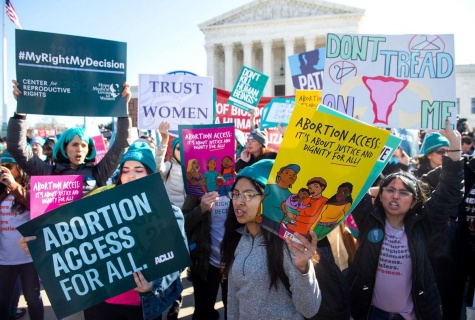
Reaghan Mulligan | Opinion Editor
May 20, 2021
The continuous polarization of ‘pro-choice’ and ‘pro-life’ rhetoric has no obvious intentions of letting up anytime soon. A Mississippi petition, Dobbs v. Jackson Women’s Health Organization, opened up an appeal to the Supreme Court of the United States and has been in their docket since fall of 2020.
Up until recently, this petition has been postponed and denied hearing by SCOTUS, but on May 17 the Court announced an approval to review the doctrine next term. Most likely, the case will be discussed and a decision will be delivered in 2022, around spring or summer.
This case is seeking to deem abortions that occur after 15 weeks of pregnancy unconstitutional, which would inevitably lead to the banning of any abortion performed after this time period. This hearing, if approved, could undermine the foundation of Roe v. Wade, which protects a woman’s bodily integrity and the ability to obtain a safe abortion without excessive government regulation.
Although Planned Parenthood estimates that 91% of legal abortions occur before the 13-week mark, Mississipi’s move to implement stricter regulations would become the basis of many conservative-based abortion intentions: to eliminate all access to safe and legal abortions.
In the past, attempts to ban abortions that are performed before the fetus reaches viability, which is deemed to be after 24 weeks gestation, have been shut down by the Court. Viability describes, in the case of pregnancy, a fetus attaining the capability of living outside of the uterus. Former cases have pursued the prohibition of abortions that occur at or after six weeks (in North Dakota) and a 12 week ban (in Arkansas), but were both denied by SCOTUS.
However, the court’s configuration has drastically changed since 2016, when many anti-abortion legislations were promptly repudiated. With the death of Ruth Bader Ginsberg and the addition of conservative appointees such as Amy Coney Barrett, the 6-3 conservative majority on the court may be the face of optimism for anti-abortion appeals yet the downfall of reproductive rights as they exist today.
Numerous attempts by state governments to inhibit reproductive rights entails the impending question of whether or not these jabs at bodily autonomy are truly to conserve a future life, or rather, efforts to control women’s autonomy in America. The latter seems much more likely, as attempts to protect and preserve a life once it exits the womb tend to be low in numbers.
If the “pro-life” movement truly was about the conservation of life, more of their energy would be focused on promoting adoption, bettering the foster care system, and working to preserve the lives of the already-born—not solely tending to the unborn prospect of life.
Limiting legality will not significantly curb the number of abortions performed; rather, it would lower the number of safe abortions, most likely resulting in a greater fatality rate for pregnant women.
In order to effectively diminish the number of abortions in the United States, action must be taken from the origin. Schools should be practicing a well-rounded, up to date approach on sexual education. The abstinence-only rhetoric taken by a surprising majority of schools both public and private seems to be more or less ineffective.
Pro-life narratives should additionally be pushing for easily accessible contraceptives, as too many forms of birth control and “day-after”pills can be difficult to obtain or too expensive to purchase.
The basis of pro-choice rests on one idea alone: a pregnant person deserves the right to determine what’s best for their own pregnancy. Continuing to provide safe and legal abortions only gives women the opportunity to maintain their rightful bodily autonomy.
“Being pro choice means supporting women and what they want to do with their bodies no matter the timing,” junior Natalia Martucci said. “In a lot of cases women aren’t ready for a child and know they can’t give that child the life they deserve.”

The decision to terminate a pregnancy must continue to rest in the hands of the person who would be obtaining the abortion. Not their mom’s hands, not their dad’s. Not Mississippi’s, or North Dakota’s, or some man who will never have a uterus in his life. It is no one’s decision but the pregnant person.
“Women should decide what they want to do with their own bodies without the regulation of a predominantly male government,” sophomore Kayla McLaughlin said. “No one except yourself will ever know and understand the exact circumstances you are in.”
The numerous attempts of government figures—notably male representatives—to harshen regulations or completely exterminate a woman’s right to an abortion is, without question, a direct attack on bodily autonomy. The decision made by the Court in months to follow could reinforce or completely diminish the foundation of reproductive rights that are continuously at stake in America.
“It is not only unconstitutional, but incredibly sad to see that we are going backwards in history,” McLaughlin said. “It is absolutely absurd that the supposedly “free” country of America wants to limit when a pregnant person can have an abortion.”
The right to bodily integrity should be warranted to any and all pregnant people without exception, and attacks on this right upheld by Roe v. Wade is, by definition, an overt violation on American women.

Leave a Reply